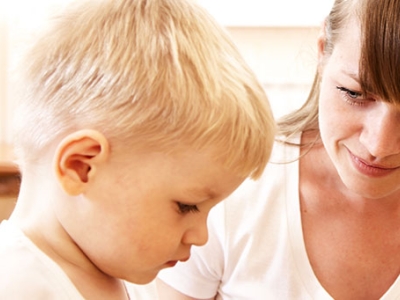
The dishes and deadlines can wait
Learning to love like our unhurried God.
A few years ago, our family was having a particularly bad flu season— a time when, for most households with young children, the snot is thick, tensions are high and complaints are rife. My family had had a long run with repeated sickness. My toddler caught the first virus, and inevitably, my husband and I fell like dominoes. Congested, sleep-deprived, and forced into self-isolation, flu season, at times, felt like a long and lonely battle.
While I could never imagine how new parents felt during the COVID lockdowns, flu season gave me a better understanding of why so many struggled with unprecedented loneliness, anxiety, postpartum depression and a lack of purpose. I came to experience the disappointment of missing important events and milestones because of sickness. I can empathise with the white-knuckled exhaustion of not having sick leave as a parent. With a pounding headache and unrelenting cough, I still have to drag myself out of bed to tend to toddler tantrums, write Bible studies, and meet work deadlines.
I write this, not because I despise parenting, but to speak realistically into a space that can be over-glamourised—and especially so in faith circles. It can be hard for mums to admit any struggle, in fear of being judged for being ungrateful, unworthy or ungodly. In a filtered world run by Boss Babes and Instagram Mums, I believe the next generation of mums (and dads) need to be equipped with right expectations, and a theology of eternity and endurance for tough times.
My friend once described parenting as a paradox of emotions, where joy and despair; satisfaction and stress can coexist and be felt simultaneously. I never understood how this could be possible, until I became a mother myself. The truth is, like any work after the Fall, even the gift and work of motherhood has been cursed with thorns and thistles.
For me personally, early motherhood can feel:
- futile: a sum total of mundane and repetitive tasks, leading to nowhere and with no finish line in sight
- exhausting: a call to carry the physical, emotional, and spiritual load of raising a child—all while running on little to no sleep
- overwhelming and overstimulating: a never-ending mental load of urgent, important and conflicting tasks
- invisible: a resume of unseen and behind-the-scenes work, without thanks, trophies or salary packages.
As much as I thank God for my daughter and delight in her, I wrestle with daily longings for greener pastures—a breather from roaring tantrums, never-ending mess, and failed nap times. I miss predictable days in the office—an ordered place where I feel competent, productive, and in control of my schedule. I miss my ‘Me Time’ where I can rest, think and write without time constraints.
God has used flu season to spotlight my imperfect love, stained by a heart of impatience. My obsession with empty sinks and getting things done has forced me to reexamine my once held belief that children are an ‘interruption’ to my work and ministry. Instead, God has been reminding me that in this season, my child’s interruptions are my ministry—opportunities to model the patience and presence of an unhurried God, in a world that’s starved of time.
In a world of hustle and hurry, I believe there is great power in a patient and present spirit. Is it a coincidence that ‘patience’ is the first descriptor of godly love (1 Corinthians 13:4), or that we’re called to ‘walk’ in the way of love (Ephesians 5:2) as opposed to hurry, run or sprint?
It’s clear from the Gospels that Jesus was always patient with human neediness, and he never ministered to others with a hurried heart. Jesus knows our creaturely needs for daily bread, love, healing and salvation—and he welcomes our ‘interruptions’ with compassion and mercy. Jesus also accepted the limits of the incarnation. He ate, slept and prayed in times of need. He trusted the Father’s timing. He never rushed to be in ten places at once.
I think of the time where Jesus accepted an interruption from the bleeding woman while he was on the way to see Jairus the Pharisee. In doing so, he showed priority to the needs of a social outcast, despite being hurried towards the Pharisee—a spiritual leader of greater social value. I think of his favouring of ‘faithful and teachable’ Mary over the ‘productive and efficient’ Martha. I think of his gracious patience towards an inner circle who were repeatedly forgetful, fickle and faithless. I think of his welcoming of children in a culture that shooed them away.
I sometimes struggle with home duties because, compared to my work outside of the home, parenting can feel slow, repetitive and invisible. What I’m learning as a stay-at-home mum, is that Jesus redefines productivity; showing me that invisible work can be invaluable. I am learning that patiently tending to the interruptions of snotty noses and temper tantrums is never done in vain, for God can use ordinary work to produce eternal fruit—both in my toddler’s heart and mine. I am learning:
- that every tantrum is an opportunity to image God—the perfect parent—who is patient, slow to anger, gentle, and compassionate to our earthly needs. Therefore, my daughter’s interruptions are opportunities to show her God’s heart
- that every difficult conversation is an opportunity to model transformative grace. There is a difference between demanding generosity and kindness from your child, and patiently (and prayerfully) pointing them to the One with the power to transform a greedy and unkind heart.
- to apologise for my impatience and misplaced frustration, and in doing so, showing my daughter that it’s OK to confess weakness, and that even Mummy is a sinner in need of grace and forgiveness.
- to accept that every hour—whether seamless or chaotic—can be repurposed for good by the One who establishes the outcomes of our plans (Proverbs 16:9). Instead of resenting interruptions and cancellations, I am learning to live within the boundaries of God’s providence and to prioritise work of eternal value.
The story of motherhood may start with a curse, but God promises that it will end with renewal and redemption. Green pastures await—a Garden free from thorns and thistles, tears and sickness, futility and impatience. This is my hope on hard days. I persevere because I am certain that the moment I step into eternity, I will breathe a sigh of relief for any effort I ever made to embrace interruptions with patience and presence; to have walked in love with faith and endurance. This isn’t just a truth for motherhood, but for all of life.
Today, my daughter still needs me in ways that she won't tomorrow. So if there’s truly a time for all things under the sun, then today, the dishes and deadlines can wait.
This article originally appeared on the ‘Heidi Tai Writes’ Substack.
---
Heidi Tai writes for truth seekers, deep-feelers, and the homesick searching for Eternity. Her stories often meet at the intersection of life, faith, and culture; and she enjoys exploring topics such as identity, womanhood, shame, family conflict, and healing from personal and intergenerational trauma. She is the author of Unmasking the Prodigal Daughter.

The Mythical Life of the Good Christian Girl
Good Christian girls love going to church, always read their Bible, never have doubts and grow up to marry good Christian boys—right? In this book, Polly Jane Butterworth addresses the disconnect many girls feel between wanting to be a good Christian girl and being unable to live up to this identity.
For more articles from Growing Faith, subscribe to our monthly e-newsletter.
To hear about the latest books and resources from Youthworks Media, subscribe here.








